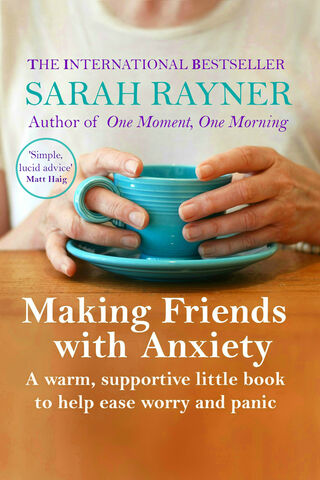Anxiety
Anyone Else Experienced Poor Mental Health This Year?
Here's how some people are getting through mental health and the pandemic.
Posted November 2, 2021 Reviewed by Vanessa Lancaster
Key points
- Bereavement, isolation, loss of income, and fear can bring on new mental health problems or exacerbate existing ones. COVID-19 gave us them all.
- The pandemic was the most traumatic experience many people have ever lived through, myself included. No wonder lots of us are feeling the strain.
- And don't be ashamed to ask for support if you need it. There is nothing bad about being depressed or anxious; it doesn't mean you have failed.
- Tips for moving forward include journaling, getting outside, meditating, and extending compassion to the self and others.

COVID-19 has left its mark on all of us. We’re fast approaching two years of living with a global pandemic, and still, it is everywhere. Even those who haven’t succumbed to the virus (and I haven’t) have been affected health-wise. Treatments for other illnesses have been put on hold, A&E waiting times are crazy, and winter is yet to come. But arguably, the most widespread repercussion has been on our mental health.
All Around Me, I See People Falling Like Ninepins
I’ve been mentally ill before, but in the last 18 months, I have witnessed friends and family members, colleagues, professional cohorts, and countless others reaching for the blister packs of antidepressant medications. Bereavement, isolation, loss of income, and fear all impact our wellbeing, which in turn can bring about fresh mental health problems or exacerbate existing ones. Many people found themselves with increased alcohol and drug use as they tried to manage insomnia and anxiety.
Friends who were used to being functional found themselves overwhelmed. Several of the young people in my circle – students and schoolkids – were, and still are, a long way from having fun. Most of them have not experienced levels of anxiety and depression before, and when it’s your first time, frankly, it can be flipping terrifying. You don’t know when, or if, you’re going to feel better and whether that equilibrium you enjoyed before will ever return.
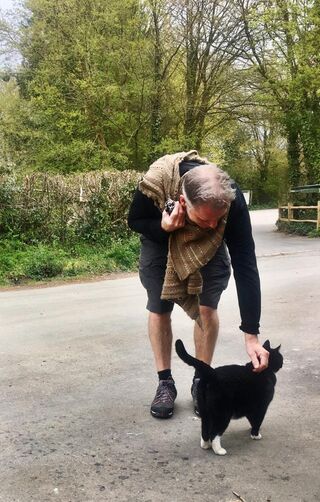
My husband, Tom, is a chef and normally so grounded that he’s the one other people turn to for support. Compared to me, his moods swing like a flower in the breeze; he is warm, witty, and wise. Yet as I type, he is seeing his therapist. Tom’s main symptom is low mood, and he is not seriously ill, but millions are, as my GP friend Patrick told me. "The system is bursting at the seams," he said. "We simply don't have the resources to help."
Thankfully, vaccines and boosters have meant fewer people are being hospitalized with Covid. Yet while we no longer live in such fear, it often takes longer to process trauma, and research suggests anxiety levels are still sky-high.
Suicidal ideation is commonplace, and whilst I was never tempted to take my own life, I found my moods swinging about wildly, like a pub sign in a hurricane. Eventually, I had a few days in the fourth lockdown when I experienced hyper-mania, something which has only happened to me once before, nearly three decades ago.
Looking back, it’s not that surprising. Tom and I lost tens of thousands of pounds. I supplement my author income with hosting on Airbnb and overnight, both room rental and creative writing workshops were no longer viable. We both fell through the net in terms of government support – authors don’t get furloughed, and as a freelance chef, much of Tom's work simply dried up.
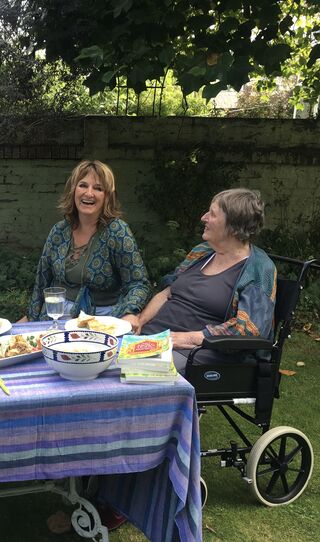
I also help a care team look after my 87-year-old mum, who lives close by us in Brighton, and from the outset of the pandemic, I was anxious about keeping her safe. She is frail and needs 24/7 care, and last winter, before the vaccine was available, I insisted Tom stop working to ensure she didn’t catch the disease. It was either that, or we stopped visiting and helping care for her, something I could not countenance.
Nonetheless, the image that haunted me for months on end was of her dying in hospital, only able to communicate with her relatives via Zoom.
Last year, Christmas was a mess. No one knew if they were coming or visiting one another, and my mum's birthday falls only a few days after Christmas Day. When one of her care team folded, I remember thinking, Fran is having the breakdown I was about to have. We missed Fran hugely, and January 2021 was a low point of this year.
In the end, months and months of uncertainty pretty much broke me. I had rows with family members and colleagues because I was so highly strung. At one point, the workings of my mind became so toxic that I started having regular flashbacks to past trauma – an assault that happened decades ago which I’d buried deep in my unconscious. I am sure without the pandemic, these memories would have remained locked away, but the constant uncertainty and stress was like throwing a match onto petrol, re-igniting my fight or flight responses and with it feelings of panic.
The pandemic was the most traumatic experience many of us have ever lived through. Only those who lived through World War 2 have seen events on such a scale. For me, the memories came flooding back, reaching ahead early one morning when I was hit with a realization so powerful and ugly that it sent my mind into overdrive.
For weeks afterward, I found myself having terrible panic attacks. At one point, I became dangerously hyper-manic, which is disconcerting to witness, and those close to me informed me that I was mad. Mad is not a descriptor I relish; I’m fine telling others I’m nuts or suffer from anxiety or depression, but coming from people I love, it felt judgmental and unkind in this context.
These days I dearly hope we have a better understanding of mental illness than we used to. Nonetheless, many people are still embarrassed to admit to vulnerability. When you’re mad is thrown out as an insult, it is not surprising that widespread reluctance to seek support remains. However, while it takes courage to admit when we are not coping, it can also be tricky from the other side: how do those who love us express concern without sounding patronizing or preachy?
One Tip Would Be to Think Empathetically Rather Than Sympathetically
Sympathy involves understanding from your perspective. Empathy involves putting yourself in another person's shoes and understanding why they might have these particular feelings. For a succinct explanation, I highly recommend Brene Brown’s brilliant video on YouTube.

Thankfully, a change in medication and weekly therapy means that now I am feeling on a more even keel. My partner and I are not starving, we have a roof over our heads, and we are not, so far, in debt to any marked degree. Pausing to focus on the positive, we are both double-vaccinated, and my mum is still with us.
Plus, as mum's wise live-in carer, Rachael, reminded me, almost everyone has had a tough time in the pandemic in one way or another.
Many Have Had It Far Worse Than I have
"It was the hardest time of my life," said 34-year-old Thérésa. She works in the travel industry, and in the first lockdown in 2020, she found herself sent home with no notice. "Overnight, I went from a sociable lifestyle where I was in an office all day in central London, meeting with clients and friends in the evening, to only seeing my two flatmates for weeks on end."
And then she was made redundant. "It was last in, first out, and crushing. I felt completely lost. I was so anxious and overwhelmed. I couldn’t focus, and I didn’t know how to care for myself."
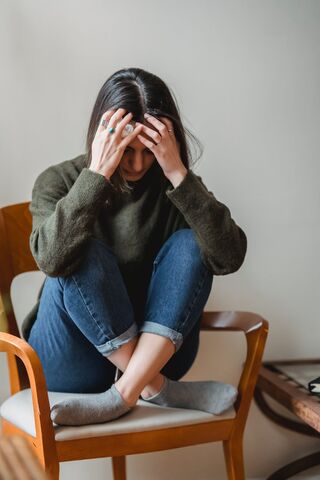
Yet gradually, Thérésa found a way through. “It was music and walking which saved me,” she said.
“Some days, I walked 35,000 Steps. People in the pandemic seemed to polarize,” she reflected. “It seems they either dealt with their demons or buried them even deeper.”
For Thérésa, the other thing which helped was writing. “Day after day, I would pour my thoughts into a notebook,” she said. “I wrote in a stream of consciousness and drew pictures too.”
Thérésa may still have some issues to work out – she would like to be more settled and is uncertain whether she wants to stay in London, but the woman I see is smiling and happy, philosophic about her experiences rather than sinking under strain.
“I found coming out of lockdown very hard,” said our neighbor, Judith, 78. Let’s not forget COVID-19 impacted the elderly most of all in many ways; their age group suffered the greatest death toll, their level of risk forced many into isolation. “I know more than one person who lost a partner and then had to cope with grieving and self-isolating,” she observed. A distressing mix, surely, for anyone; even the most resilient would find it hard to process such losses alone.
Moving Forward, Here Is What I Would Like To See
1. Let’s stop condemning those who take medication. I’m not suggesting people start popping pills as if they were M&Ms, but the evidence is strong that the most successful treatment for a mind that’s out of kilter is a mix of approaches. Therapy, medication for those in a dark or difficult place that they can’t get out of, and other holistic activities which bring the mind, body, and spirit into the equation.
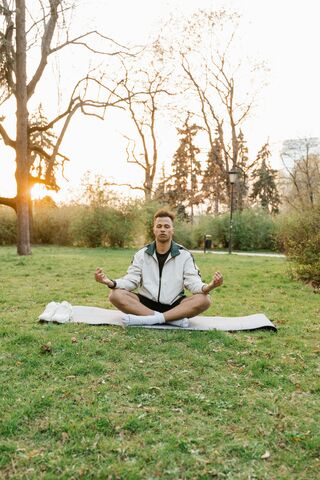
2. Yoga, wild swimming, ballroom dancing, or whatever floats your boat, it’s important to remember that your mind is connected to your body; your head is not a separate entity. What benefits one will help care for the other, so don’t allow either the intellectual or the physical to dominate, but strive to find a balance between the two.
3. Don’t take everything too seriously - laughter is healing. Some of the funniest people I’ve met have been those suffering from bouts of poor mental health. Dark humor can be a great release, but not all the laughter is cynical: I’m currently in a group studying DBT (Dialectical Behavioral Therapy), and I love the way my fellow group members laugh at each other and themselves. Even the therapists are funny, but respectfully and affectionately so.
4. Get outside. We are at the time of year when people are more inclined to hunker down. Some days I envy those creatures that can hibernate till spring. I have had times when I fancy spending all day hiding under the duvet like a hedgehog tucked a pile of leaves. But deep down, I know that being outside nature is better for me than spending day after day in centrally-heated isolation.

5. Depression often makes me feel like withdrawing, and occasionally I give myself permission to do just that. But ultimately, I prefer to engage with others. I like writing, but I love chatting. So this winter, I hope to goodness we all get to enjoy a bit more company and relish gossiping and being garrulous, even if much of it is via Zoom.
6. Finally, let’s extend the same compassion to ourselves that we would to others. Support is paramount, but there is little purpose in lending it to others if we cannot do it for ourselves. So stop, breathe, and ask yourself what you need to care for yourself, right here, right now. It might be listening to a guided meditation. Or your favorite football podcast. Or going to see FatBoy Slim. Make space to do it, and if you feel guilty, notice that self-criticism, and let it go.
